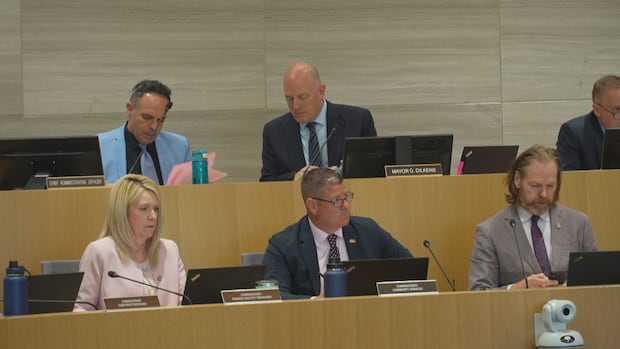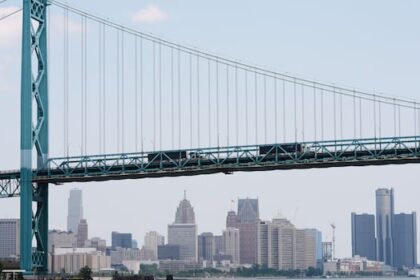Windsor and Toronto have used controversial strong mayor powers 82 times each, more often than in any other big city in Ontario.Under Premier Doug Ford, the Progressive Conservative government created the Strong Mayors, Building Homes Act to help municipalities construct more homes and tackle other provincial priorities.The special powers — which became active for Toronto and Ottawa in November 2022, followed over time by dozens of other communities less than a year later — allow most mayors to make certain decisions with or without council’s involvement.Each time a mayor uses one of those powers, it’s chronicled on the municipality’s website.CBC collected the data from each of the province’s 10 largest cities to document how many times strong mayor powers have been used. In Windsor, where powers have been in place since July 1, 2023, Mayor Drew Dilkens used his authority those 82 times to make a variety of decisions. The other seven cities documented by CBC were also granted those powers on that date.”With [strong mayor powers] redefining the municipal budget process, I have been able to support key initiatives in housing, transit and infrastructure, aligning with provincial priorities,” said Dilkens in an emailed statement.Dilkens declined CBC’s interview request, saying he was unavailable the week leading up to publication of this article.”I’ve followed the legislation, working in lockstep with city administration, and in consultation with city council and the public to table our budgets,” Dilkens said.Out of the 82 instances, 38 of them involved approval of bylaws, which is an administrative process to indicate he will not being using a veto.’It’s not a consultative process’In more than 30 instances, Dilkens used strong mayor powers related to the employment of senior staff. He said those moves are “are conducted in consultation with the whole of city council.”But Coun. Fred Francis said he’s not always consulted.”I have not every time. There’s been instances where I found [out] when the news media broke it.”Windsor Coun. Fred Francis says he is ‘totally against’ strong mayor power legislation in Ontario. (Jason Viau/CBC)When Dilkens does reach out and ask for input, Francis said, he always asks if Dilkens has already made a decision.”Most of the time, it’s, ‘No the decision has been made, but I want to hear what you have to say,'” Francis said the mayor tells him. “It’s not a consultative process.”Ottawa is just behind Windsor and Toronto in the number of times strong mayor powers have been used.Here’s how the top 10 most populous cities fare: Windsor: 82. Toronto: 82. Ottawa: 81. Mississauga: 67. Hamilton: 64. Kitchener: 60. Brampton: 58. Vaughan: 38. London: 25. Markham: 0. A spokesperson said the mayor has only used strong mayor powers for budgetary requirements. London’s Josh Morgan said he uses his strong mayor powers sparingly and in a collaborative approach with other members of council.”The powers can be used in a way that respects your colleagues and can get things done a lot quicker,” he said.London Mayor Josh Morgan says he takes a more collaborative approach when using strong mayor powers. (Jason Viau/CBC)Although he has the ability to veto decisions of council, Morgan said, he “could never contemplate” using his veto power.”Because I think as a council we make really good collaborative decisions,” said Morgan.Veto may cause ‘animosity’ on councilWhen he was first elected in 2022, Morgan introduced a neighbourhood decision program in the budget, which was passed.More recently, the majority of council voted to remove that program from the budget even though Morgan disagreed with the decision.”I didn’t veto it. I could have,” said Morgan. “To me, on that it would have led to some animosity between other members of council, probably compromise my ability to get all of the things done that I’ve gotten done since then.”In Windsor, Dilkens has exercised his veto powers once.In February, the majority of council voted to keep the Transit Windsor tunnel bus service running between the southwestern Ontario city and Detroit.However, Dilkens vetoed that decision and single-handedly shut down the service, which officially came to an end in August. Special events buses will continue to cross the border until the end of the year.Dilkens says he’s used strong mayor powers to ‘support key initiatives in housing, transit and infrastructure, aligning with provincial priorities.’ (Chris Ensing/CBC)At the time, Dilkens said, he shut down the service because of the costs to the taxpayers, but also because of U.S. President Donald Trump’s tariff threats against Canada.After the vote, Francis called it “a sad day for democracy in Windsor.””I think it’s caused a lot of division in the community,” he told CBC News on Monday. “I think it’s sidelined city councillors to the point that city councillors have never been sidelined. I think it’s changed the dynamic between city councillors and members of administration.”On Sept. 1, Strategy Corp., a business and public policy advisory company, conducted a survey released Sept. 1 that anonymously interviewed 32 chief administrative officers (CAOs) across Ontario.In the survey, most of those CAOs expressed views of frustration, or even anger, about the use of strong mayor powers.”There is a significant concern about losing the objectivity of the professional public service with strong mayor powers,” said Stacy Hushion, vice-president of municipal services at Strategy Corp.Stacy Hushion is vice-president of municipal services at Strategy Corp. She conducted interviews with 32 chief administrative officers across Ontario, asking them about strong mayor powers. (Jason Viau)She said strong mayor powers blur the lines between the political and administrative divide that previously existed between elected members of council and city staff tasked with providing advice.”But what we’ve seen now is concern that the quality of that advice may not be at that the same level it was before because you’ve got senior leadership who may be trying to satisfy a mayor in order to keep their jobs.” Civil servants take on more political roleIn some municipalities, there may be a shift to administration being impartial, neutral and objective civil servants to “serving in more of a political role,” said Hushion.Joe Lyons, an assistant professor in Western University’s political science department, agrees.The “advice that is coming to council is now being tempered,” said Lyons, “because people want to protect their jobs potentially or they were hired by the mayor and are kind of telling the mayor what they want to hear.”So, you know, that raises concerns about … the quality of municipal government in general.”
Wednesday, 4 Mar 2026
Canada – The Illusion
Search
Have an existing account?
Sign In
© 2022 Foxiz News Network. Ruby Design Company. All Rights Reserved.
You May also Like
- More News:
- history
- Standing Bear Network
- John Gonzalez
- ᐊᔭᐦᑊ ayahp — It happened
- Creation
- Beneath the Water
- Olympic gold medal
- Jim Thorpe
- type O blood
- the bringer of life
- Raven
- Wás’agi
- NoiseCat
- 'Sugarcane'
- The rivers still sing
- ᑲᓂᐸᐏᐟ ᒪᐢᑿ
- ᐅᑳᐤ okâw — We remember
- ᐊᓂᓈᐯᐃᐧᐣ aninâpêwin — Truth
- This is what it means to be human.
- Nokoma











